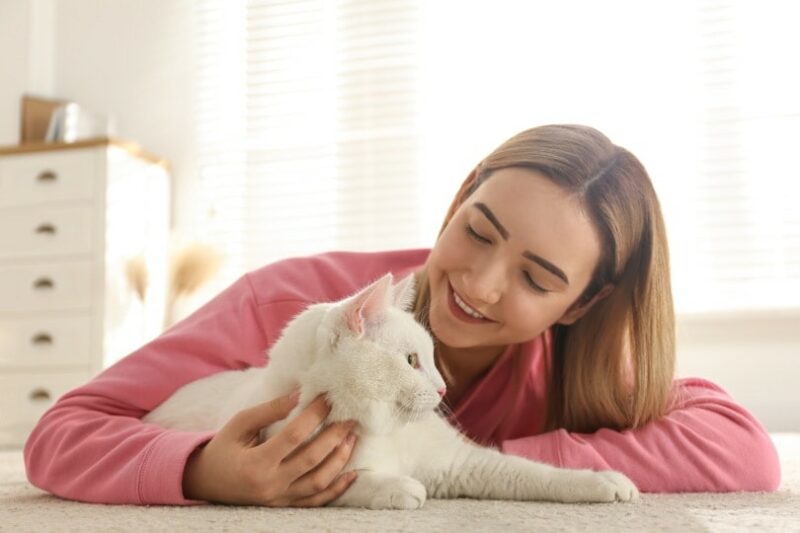Cats are perceived as lazy creatures. It’s true that they enjoy lounging around and taking naps, but that doesn’t mean they don’t need mental stimulation too. A bored cat can become destructive or obese or develop other behavioral problems. That’s why it’s important to provide your feline friend with plenty of ways to keep them mentally stimulated.
In this article, we will discuss 12 different ways to do just that!
The 12 Ways to Provide Mental Stimulation for Cats
1. Offer a Variety of Toys
You might think that your cat only needs one or two toys to keep them entertained, but that’s not the case. Cats get bored easily, so it’s important to offer a variety of different toys for them to play with. You can find a wide variety of cat toys at your local pet store. Be sure to rotate the toys every few weeks to keep things interesting for your feline friend.
Cats are natural hunters and love to stalk their prey. Toys encourage cats to engage in this type of behavior. There are a variety of toys on the market that allow cats to stalk and pounce on their prey. These types of toys are great for mental stimulation and can help keep your cat’s hunting instincts sharp.
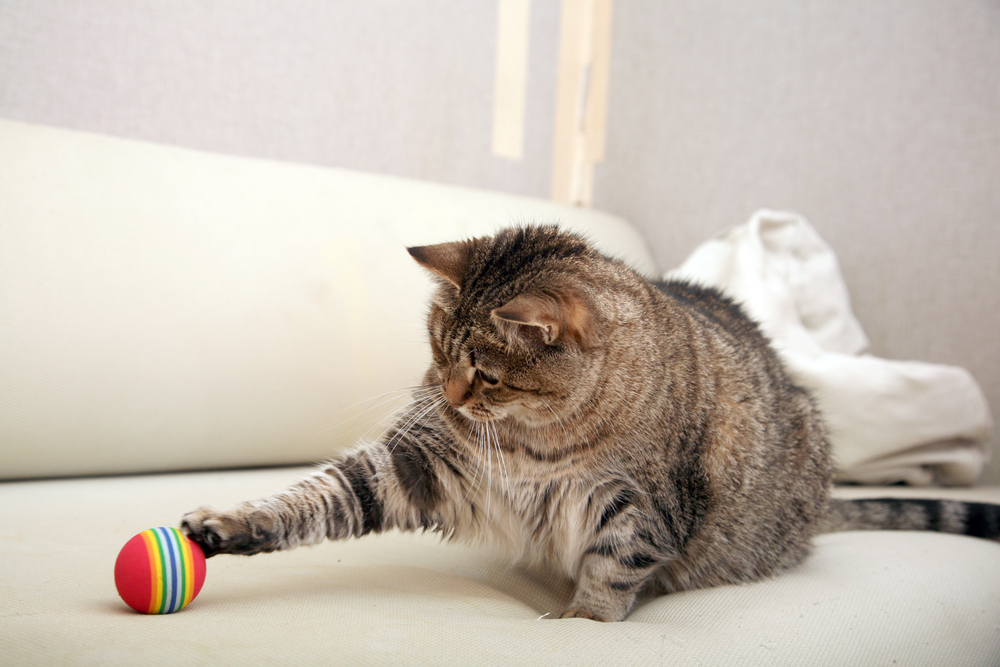
2. Interact with Them
Another great way to provide mental stimulation for your cat is to interact with them daily. This can be done through playtime, grooming, or simply spending time talking to them. Cats love companionship and interacting with their humans on a regular basis will help keep them happy and mentally stimulated.
Playing is an important part of keeping your cat mentally and physically engaged, and a great toy will make it much easier. We like Hepper's Catnip Stick Toys because they're sturdy enough to handle intense play and completely filled with organic catnip. You'll love the fun range of pastel colors and your cat will enjoy the prey-like shape!
At Catster, we’ve admired Hepper for many years and decided to take a controlling ownership interest so that we could benefit from the outstanding designs of this cool cat company!
3. Teach Them New Tricks
You might not think that cats can be trained, but that’s not true! Cats are very intelligent creatures and can learn a variety of new tricks. Teaching your cat new tricks is a great way to provide mental stimulation and bonding time between you and your feline friend. There are loads of resources available online that can help you get started teaching your cat new tricks.
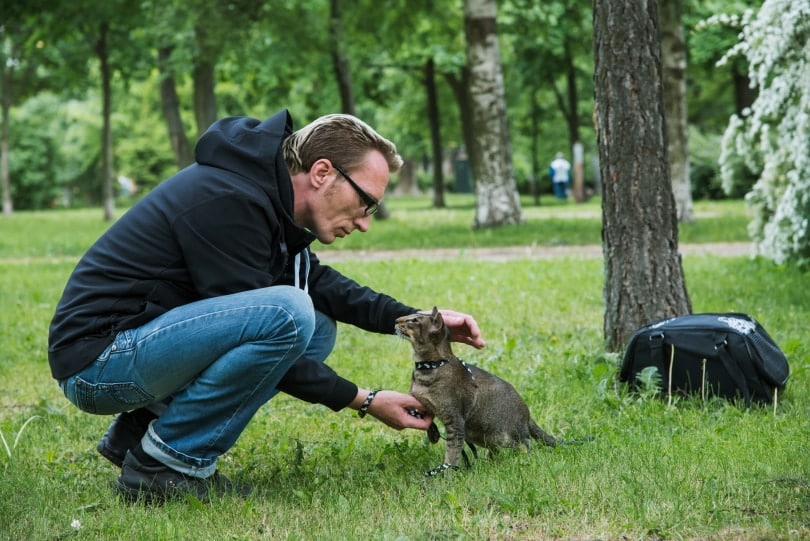
4. Let Them Scratch
Cats love to scratch! It’s important to provide them with a scratching post or other type of scratching object to help satisfy this natural behavior. Not only will it save your furniture from being ruined, but it will also provide mental stimulation for your cat. Scratching is a great way for cats to stretch their muscles and relieve stress.
Please Note: Claws are very important to a cat’s welfare and quality of life. Declawing is strongly discouraged by the veterinary community.
5. Create an Obstacle Course
Cats are natural acrobats and love to jump and run. Creating an obstacle course in your home is a great way to provide mental stimulation and allow your cat to get some exercise. There are a number of different ways you can create an obstacle course for your cat. You can use furniture, boxes, or even purchase special cat obstacles from your local pet store.
6. Give Them Something to Hide In
Cats love to hide and feel safe in small spaces. Giving them something to hide in, such as a cardboard box or tunnel, is a great way to provide mental stimulation and help them feel secure.
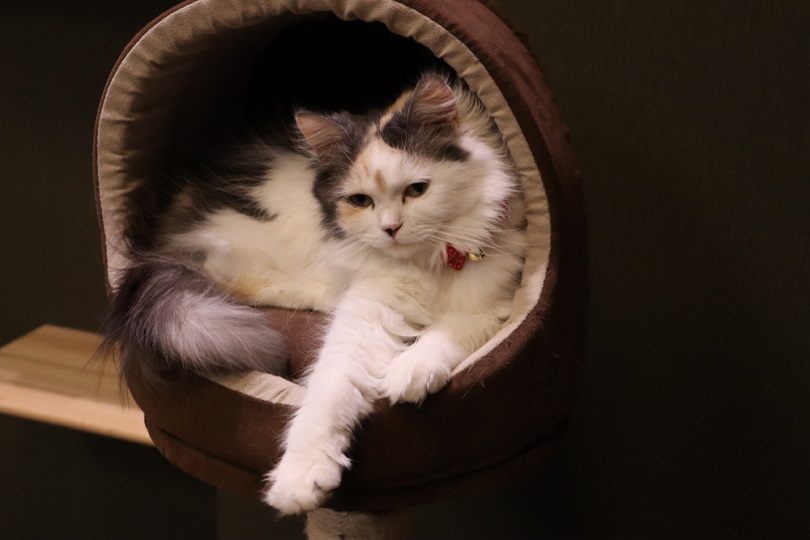
7. Use a Puzzle Feeder
Puzzle feeders are a great way to provide mental stimulation for your cat and help them stay active. Puzzle feeders challenge your cat to figure out how to get the food out of the toy. This is a great way to keep their minds sharp and their bodies active.
Puzzle feeders also slow down their eating to help manage appetite and gastrointestinal upset like reflux in some cats. When using these feeders as a source of mental stimulation, be careful not to overfeed your cat with treats!
8. Install a Cat Tree
Cat trees are a great way to provide mental and physical stimulation for your cat. Cat trees offer a place for cats to climb, jump, and scratch. They also provide a safe place for them to perch and watch the world go by. Cats that are recovering from a surgery and are under post-operative care should not be allowed on trees.
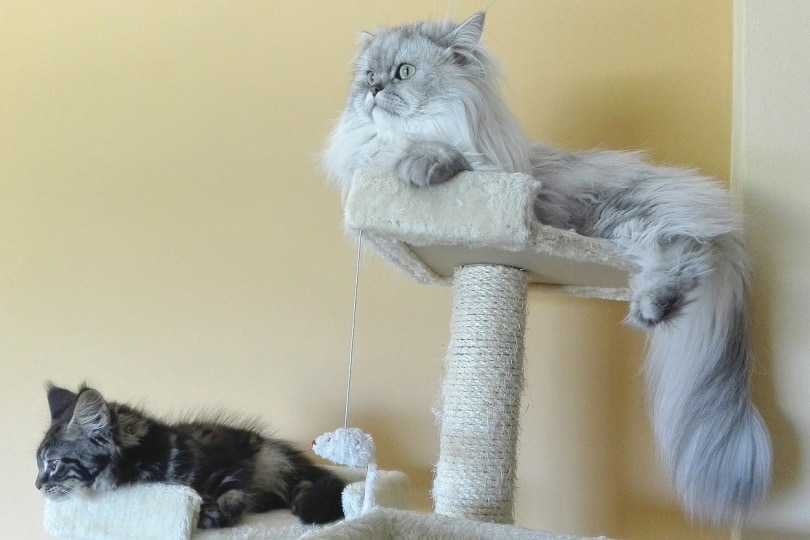
9. Give Them a View
Cats love to watch the world go by, and they feel safe when they’re up high. Giving them a window seat or catio is a great way to provide mental stimulation and allow them to enjoy the outdoors safely. Ensure the window isn’t directly in strong sunlight, as cats can get sunburned. Exposure to high amounts of sunlight can also serve as a risk factor for some cancers in cats. Cats with sparse or no hair, such as the Sphynx, can easily burn in the sun.
10. Build a Catio
A catio is a great way to provide mental stimulation and allow your cat to enjoy the outdoors safely. A catio is a fenced-in area that allows cats to enjoy the outdoors without the dangers of cars, other animals, and humans.
You can purchase a catio kit, build one yourself, or hire a professional to build one for you. You can even convert your small apartment balcony to a cat-safe outdoor space. Ensure that the catio has plenty of safe shady areas for your cat and is escape-proof.
11. Take Them for Walks
You can also take your cat for walks! This is a great way to provide stimulation and allow them to get some fresh air (if they don’t mind a leash). You can take your cat for walks in various ways; you can purchase a harness and leash, or you can use a stroller. Cats that don’t enjoy these walks or don’t appreciate a leash or stroller can be offered a cat wheel or treadmill so that they can exercise and walk indoors if needed.
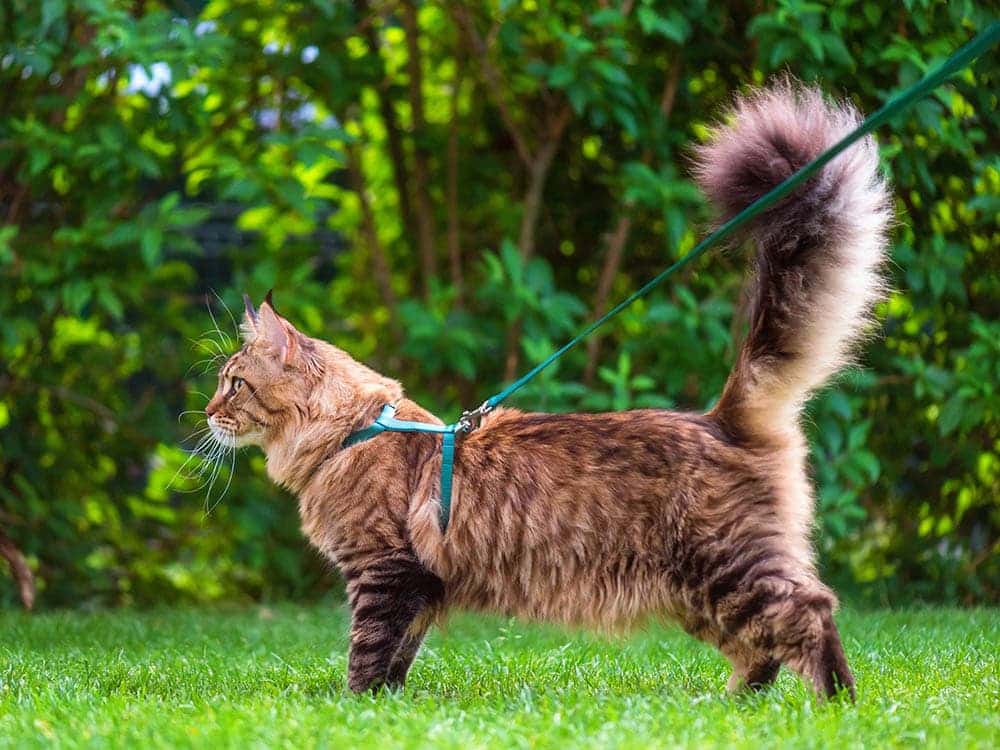
12. Give Them a Friend
Cats are social creatures and some cats may love to interact with other cats. If you have the space, adopting another cat is a great way to provide mental stimulation for your cat, depending on your cat’s personality and demeanor.
If you are unsure whether your cat will tolerate another in the home, consider fostering cats from rescues and shelters. This way, you can help a cat in need and see if your cat will benefit from another feline friend without the commitment.
As a health precaution, always quarantine a new pet away from your existing fur kid for a period of at least 2 weeks. During this time, ensure that you don’t share bowls, litter boxes, toys, beds, and other tools (for example: nail clippers) between the two individuals. Thoroughly wash your hands before and after you interact with each cat.
The new addition to your family might be harboring an illness that could spread to your existing fur baby if you rush an introduction. A period of at least 2 weeks allows each cat to familiarize themselves with the other’s scent, while also giving you ample time to observe the newcomer to see if they develop signs of an illness.
Ensure that your veterinarian gives your new addition a thorough checkup before attempting a physical introduction with your existing pet. It is ideal to have potential newcomers checked by your vet both at the start and end of their quarantine period.
Why Is Keeping Your Cat Mentally Stimulated Important?
Mental stimulation is important for cats because it helps them stay active and sharp as they age. It also helps to reduce stress and anxiety. Cats that are bored or stressed are more likely to develop behavioral problems, such as:
- Excessive grooming
- Aggression
- Spraying
- Destroying furniture
- Compulsive eating
Providing mental stimulation for your cat is easy and can be done with a few simple toys and activities. By providing mental stimulation for your cat, you can help them live a longer, happier, and healthier life.
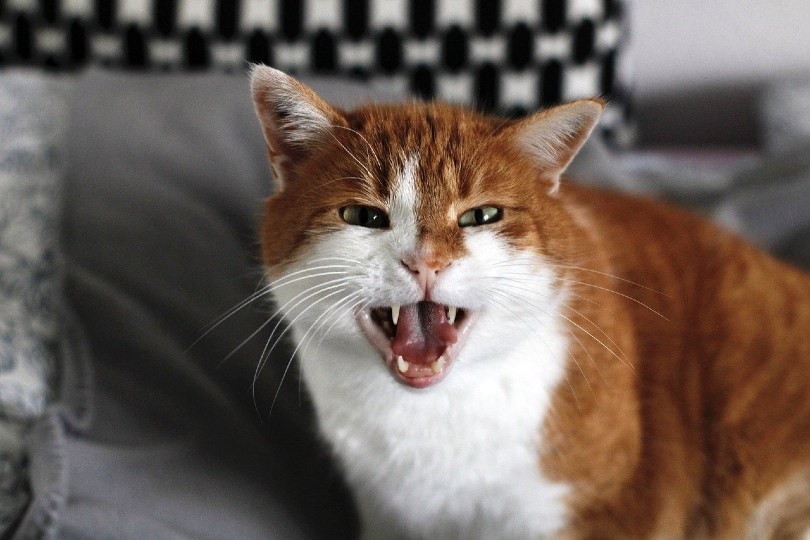
Do Indoor Cats Get Depressed?
Cats are natural predators, and, as a result, they love to explore their surroundings. When they are kept inside all the time, some cats can become bored and depressed. Welfare recommendations in some parts of the world do advocate for allowing cats to roam outdoors (under supervision). Many owners keep their cats indoors to protect them from the dangers of the outdoors, but this does not mean that they should be deprived of mental stimulation.
Indoor cats need extra care to ensure they are properly enriched. This means providing them with a variety of toys, climbing structures, perches, and hiding places. It is also important to give them plenty of attention and spend time playing with them every day. Your cat’s enrichment needs will depend on their individual needs and personalities.
A lack of mental stimulation can lead to depression in cats. Signs of depression in cats include a loss of appetite, lethargy, and hiding. If you think your cat may be depressed, talk to your veterinarian. They can help you create a plan to provide mental stimulation and help your cat feel better.
Final Thoughts
Mental stimulation is important for cats of all ages. It helps them stay active and sharp, reduces stress and anxiety, and can help prevent behavioral problems. You can provide mental stimulation for your cat in so many different and fun ways! By taking the time to do so, you can help your cat live a longer, happier, and healthier life.
Featured Image Credit: New Africa, Shutterstock
Contents
- The 12 Ways to Provide Mental Stimulation for Cats
- 1. Offer a Variety of Toys
- 2. Interact with Them
- 3. Teach Them New Tricks
- 4. Let Them Scratch
- 5. Create an Obstacle Course
- 6. Give Them Something to Hide In
- 7. Use a Puzzle Feeder
- 8. Install a Cat Tree
- 9. Give Them a View
- 10. Build a Catio
- 11. Take Them for Walks
- 12. Give Them a Friend
- Why Is Keeping Your Cat Mentally Stimulated Important?
- Do Indoor Cats Get Depressed?
- Final Thoughts

